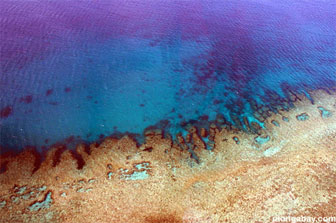Microbes could be the key to coral death
Microbes could be the key to coral death
Society for General Microbiology
April 2, 2008
|
|
Coral reefs could be dying out because of changes to the microbes that live in them just as much as from the direct rise in temperature caused by global warming, according to scientists speaking today (Wednesday 2 April 2008) at the Society for General Microbiology’s 162nd meeting being held this week at the Edinburgh International Conference Centre.
Tropical ecosystems are currently balanced on a climate change knife edge. Corals in coral reefs, which are made up of animals called polyps that secrete hard external skeletons of calcium carbonate, are living perilously close to their upper temperature limits. This makes them very vulnerable to even small temperature rises of 1-2°C above the normal summer maximum.
“Many of the deaths we see in the coral reefs, which occur following coral bleaching events, when huge areas of reef die off like in 1998 when 17% of the world’s reefs were killed, can be put down to changes in the microbes which live in and around the reefs,” says Dr John Bythell, a biologist from Newcastle University. “These microbes can be thought of as being similar to the bacteria that normally live in our guts and help us digest our food.”
 Widespread butterflyfish may go extinct due to global warming, pollution (2/24/2008) The Chevroned Butterflyfish, a colorful fish found in tropical oceans around the world, faces extinction due to overexploitation, pollution and climate change, report researchers writing in the journal Behavioural Ecology and Sociobiology. Despite its widespread distribution, the species could be doomed by its specialized feeding habitats: the Chevroned Butterflyfish (Chaetodon trifascialis) feeds on only one type of coral.
Natural ocean thermostat may protect some coral reefs
Global warming will degrade 98% of coral reefs by 2050 |
Changes in sea temperature caused by climate change and global warming affect corals, but they also affect the types of bacteria and other microflora that live with them. When the water warms up, some disease-causing bacteria are more successful and can attack the corals. The corals themselves suffer from heat, which reduces their defences. Also, some of the friendly bacteria that normally live in the corals’ guts become weakened, allowing other harmful bacteria to multiply and cause diseases or other problems.
For many communities in developing countries, which rely on coral reefs for their fisheries and tourism income, the loss of coral reefs has major impacts on their economies. They also lose valuable coastal defences and land to coastal erosion, affecting human welfare in the communities.
“We need a better understanding of the processes and mechanisms that impact on corals and the reefs when sea temperatures rise to confirm the ultimate causes of their decline,” says Dr Bythell. “Although local actions to reverse the overall decline in reef health are probably not feasible, we need this better understanding to try to reduce or eliminate contributing causes. Some of the changes in the microbes’ environment could be locally managed, for example by reducing general pollution, cutting soil erosion into the sea which chokes the reefs, and avoiding harmful run-off from farming practices.”
A key factor newly identified by the Newcastle team is the role of surface mucus secreted by corals. This seems to act as a shield, preventing disease-causing pathogens such as bacteria and some viruses from penetrating their tissues.
“The reefs’ defensive mucus or slime is also at risk from stresses brought on by climate change. This seems to happen just at a time when some of the key functional microbe groups are changing, reducing the corals’ other defences and boosting some disease-causing bacteria, making them more virulent,” says Dr Bythell.
“If we want to protect and conserve these reefs for the future, we need to start acting now. And before we can do that we need a better understanding of the processes,” says Dr John Bythell. “The mass mortality of two of the dominant coral species in the Caribbean due to disease has been unprecedented in the last 3,000 years, which suggests a strong link to man-made activities.”
The Newcastle scientists are concerned that despite the clear relationship to underlying factors affecting the reefs which cause the diseases and bleaching, and the important role played by the microbes, microbiology and coral cellular biology are investigated largely independently by different groups of researchers using different approaches. According to Dr Bythell, scientists’ attempts to identify the underlying problems would be improved by combining molecular microbial techniques with coral cell and molecular approaches.